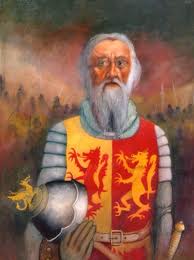
In history he is known as the son of Urien and a prince of Rheged. Eugenius is the Roman equivalent of his name. He, like his father, fought the Northern Angles towards the end of the sixth century. In a churchyard in Penrith is the so-called Giant’s Grave that was regarded for a long time as his and an elegy on his death was composed by the Welsh bard Taliesin.
He later became a hero of Welsh legend. He was pulled into Arthurian saga anachronistically, because he was unknown at the time Culwych and Olwen, which never mentions him, was written. This might be the result of brief allusion to him found in Geoffrey of Monmouth. A Welsh triad names his mother as Modron, originally a Celtic goddess. He is a character in The Dream of Rhonabwy and Owain (or The Lady of the Fountain).
Owain probably dates from around the thirteenth century and is one of the “three romances” of Middle Welsh prose the others being Geraint and Enid and Peredur. There is an undefined relationship between them and certain romances by the french Chrétien de Troyes, namely Yvain, Eric et Enide and Perceval. One claim is that the Welsh versions are direct derivations of the French versions by either translation or oral recollection. Another hypothesis is that both Welsh and French versions originate from a common source, an Old French text itself adapted from Welsh and Breton materials.
Yet others hold that the Welsh versions were used for patriotic purposes because they exhibit dynastic themes based on sovereignty myths and these in turn are the basis for Chretien’s work. There are, however, French influences evident in the existing versions. That said, none of the texts can be shown to be a direct translation and each of the stories have varying degrees of resemblance to the French. In addition, all are prime examples of Middle Welsh prose style.
Owain tells the tale of the defeat of the Knight of the Fountain by one of the Knights of the Round Table who then marries his widow, the Lady of the Fountain. Upon his return to Arthur’s court, he forgets his wife however, the realization of his neglect drives him mad. When restored to health, he defeats his opponents with the aid of a lion, ultimately regaining his knighthood and his wife. There is a theme to this “romance” about Owain’s path to self-awareness and maturity. This theme, along with it’s courtly setting, hints at an attempt to adapt chivalric romance to Welsh narrative tradition and therefore places this tale in a different category from other Welsh stories.






























